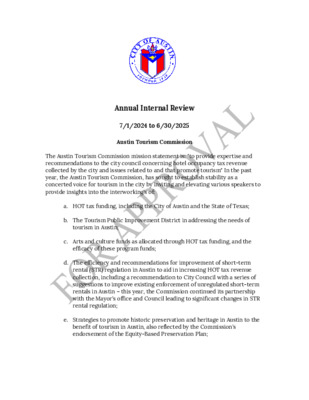Tourism Commission Annual Internal Review FY24-25 — original pdf
Backup

Annual Internal Review 7/1/2024 to 6/30/2025 Austin Tourism Commission The Austin Tourism Commission mission statement is: "to provide expertise and recommendations to the city council concerning hotel occupancy tax revenue collected by the city and issues related to and that promote tourism" In the past year, the Austin Tourism Commission, has sought to establish stability as a concerted voice for tourism in the city by inviting and elevating various speakers to provide insights into the interworking’s of: a. HOT tax funding, including the City of Austin and the State of Texas; b. The Tourism Public Improvement District in addressing the needs of tourism in Austin; c. Arts and culture funds as allocated through HOT tax funding, and the efficacy of these program funds; d. The efficiency and recommendations for improvement of short-term rental (STR) regulation in Austin to aid in increasing HOT tax revenue collection, including a recommendation to City Council with a series of suggestions to improve existing enforcement of unregulated short-term rentals in Austin – this year, the Commission continued its partnership with the Mayor’s office and Council leading to significant changes in STR rental regulation; e. Strategies to promote historic preservation and heritage in Austin to the benefit of tourism in Austin, also reflected by the Commission’s endorsement of the Equity-Based Preservation Plan; f. Strategies to promote cultural heritage districts in Austin, including that of the Red River Cultural District for which the Commission passed a recommendation to fully fund the District; g. Strategies to promote cultural venues, such as the Doherty Arts Center Project for the betterment of the local tourism economy, including a recommendation to Council to continue with funding the Doherty Arts Center Project; h. Strategies to promote library and cultural institutions for tourism, such as the Austin History Center and the Umlauf Museum and Sculpture Garden through presentations from various cultural institutions; i. Strategies to promote clean air in Austin bars and tourism venues through presentations from the Austin Public Health Department and the American Heart Association regarding the dangers of vaping in addition to smoking; j. Strategies to track and promote tourism more broadly in Austin, including outlook presentations from Visit Austin and the Tourism Director of the Office of the Governor of Texas; k. The Austin Convention Center Department on the Austin Convention Center Project; l. Strategies to connect infrastructure projects for the betterment of tourism outcomes, including Austin Bergstrom International Airport Improvements and Project Connect; m. The newly-created Arts, Culture, Music, and Entertainment Department of the City of Austin and its impact on Tourism; n. Public comment periods that have helped elevate issues as they pertain to tourism, including the relocation and restoration of Austin Convention Center art, leading to a resolution of this particular issue; o. An assessment of the efficacy and impact of film tax credit incentives and the impact of the Austin Film Festival for tourism in Austin, including presentations from the Austin Film Festival and the Austin Film Commission; p. A review of Austin Independent School District facilities and venues available for tourism uses, leading to a working group to determine how AISD may increase the tourism use of these facilities; and 2 q. Pursuant to the above, the Austin Tourism Commission has followed the intent of Austin City Council by providing its expertise and recommendations in-line with its mandate concerning hotel occupancy tax revenue and issues related to and promoting tourism. The following are the Tourism Commission's goals and objectives for the new calendar year: a. Continue discussions that aid in increasing HOT tax revenue in the City of Austin for uses pertaining to tourism-related activities, including but not limited to: STR rentals, ACME Cultural Arts and Heritage Grants; b. Continue to host topical meetings to engage tourism commissioners, the public, City staff, and members of the City Council, in timely and relevant topics that pertain to the HOT tax and improving tourism outcomes in Austin, including topics such as the tourism benefits of: film incentives, historic preservation, special events, cultural districts, use of public facilities for tourism, and general economic studies of the tourism economy and its sectors; c. Continue to advocate for the most efficient and cost-effective spending of HOT tax dollars for tourism aims in Austin; d. Fully fill vacancies on the Commission addressing needed areas for representation of the tourism economy; and e. Serve as a sounding board and body of action in implementing needed recommendations and conversations surrounding increasing HOT tax revenues and the tourism industry of Austin. 3